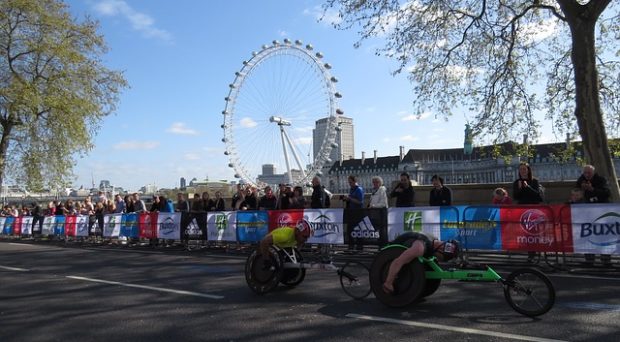
Training for the London Marathon is no joke. Every one of the 26.2 miles requires dedication, ability and ambition. It’s not just about slaving away in the gym though; good nutrition is the key to success. The London Marathon has a plethora of information about training and nutrition that should help you make a solid plan for pre- and post-race day nutrition, but researchers are also making strides, looking at the impact of nutrition and exercise.
Improving athletic performance
It’s no secret that eating well and staying hydrated is an essential part of an athlete’s training, but could what we’re eating and drinking help us perform even better?
Research is looking at ways to improve athletic performance through nutrition. For example, the PEPTIDE trial, whose protocol is published in Trials, is looking at whether consuming protein after exercising could help boost performance. The results from this trial will hopefully be able to maximize athletic performance and help increase endurance exercise training, which is especially helpful for marathoners.
When you consider how long a marathon takes (around three to four hours) then it seems clear that this can lead to a lot of damage to the body.
Nutrition can also play a role in helping the body recover after vigorous exercise. All forms of exercise cause oxidative stress on the body leading to cell damage. When you consider how long a marathon takes (around three to four hours) then it seems clear that this can lead to a lot of damage to the body. Antioxidants are a good way to reduce the effects of oxidative stress. This study looks at the impact of antioxidant supplements on improving exercise performance in hot environments. This can be helpful for athletes who have to perform in hot weather.
Sports drinks also claim to help improve athletic performance, especially after vigorous exercise as they can rehydrate your body. But are they really any better at rehydrating then regular old H2O? The Swim Drink study puts sport drinks to the test by comparing drinking water and sports drink on swimmers’ athletic performances. The results of this study might help you next time you are deciding between buying a sports drink or just sticking to the tap.
Nutrition is not always limited to food or drink. Recently, there has been interest in essential oils and how they can impact athletic performance. This study, whose results were published in The Journal of International Society of Sports Nutrition explores if inhaling essential oils can improve lung function in male student athletes. Their study found that they were effective on improving exercise performance and respiratory function, but larger studies are needed to find out if this really could be the next big thing.
Nutrition and exercise after illness
Nutrition is not just important for improving athletic ability. The 2015 Global Burden of Disease have again looked at what causes poor health and have confirmed that high body-mass index (BMI) is a major risk factor for disease. Clearly, diet and exercise play an important role in preventing future illnesses, but they can also play a role after illnesses.
As there is evidence that being overweight increases the risk of cancer from recurring, this study, whose protocol is published in Trials, hypothesizes that diet and exercise could help breast cancer patients who are overweight or obese to lose weight, therefore reducing their risk of cancer recurring. The PrEvENT trial, recently published in Trials looked at how feasible exercise and diet interventions are for men who had their prostate removed due to prostate cancer in the hopes that a healthier diet could prevent the cancer from returning.
So just how feasible is healthy eating?
Eating healthy is not always easy and can be expensive. Sometimes you need a little education about how good food can come at a low cost. Researchers at Maastricht University in the Netherlands aim to prove this through their study that uses budgeting and nutrition sessions to show how to eat healthily on a budget.
Sometimes you need a little education about how good food can come at a low cost.
Sometimes it can be your job that can make you live a sedentary lifestyle, and that’s why the SHIFT study looks to long distance lorry drivers to see if providing tips on healthy eating and with tailored exercises can improve their health. As the workplace has become an important place to promote a healthy diet, researchers at the University College Cork in Ireland are studying if the workplace can be effective in promoting positive changes in diets, health status and diet-related disease risks (you can find their study protocol in Trials).
The run-away message
It is clear that researchers are exercising a lot of their time and energy into helping people live healthy lives. Ok, so maybe you aren’t training for a marathon, but I hope that this year’s London Marathon and research into nutrition and exercise can give you a #ReasonToRun.
Comments